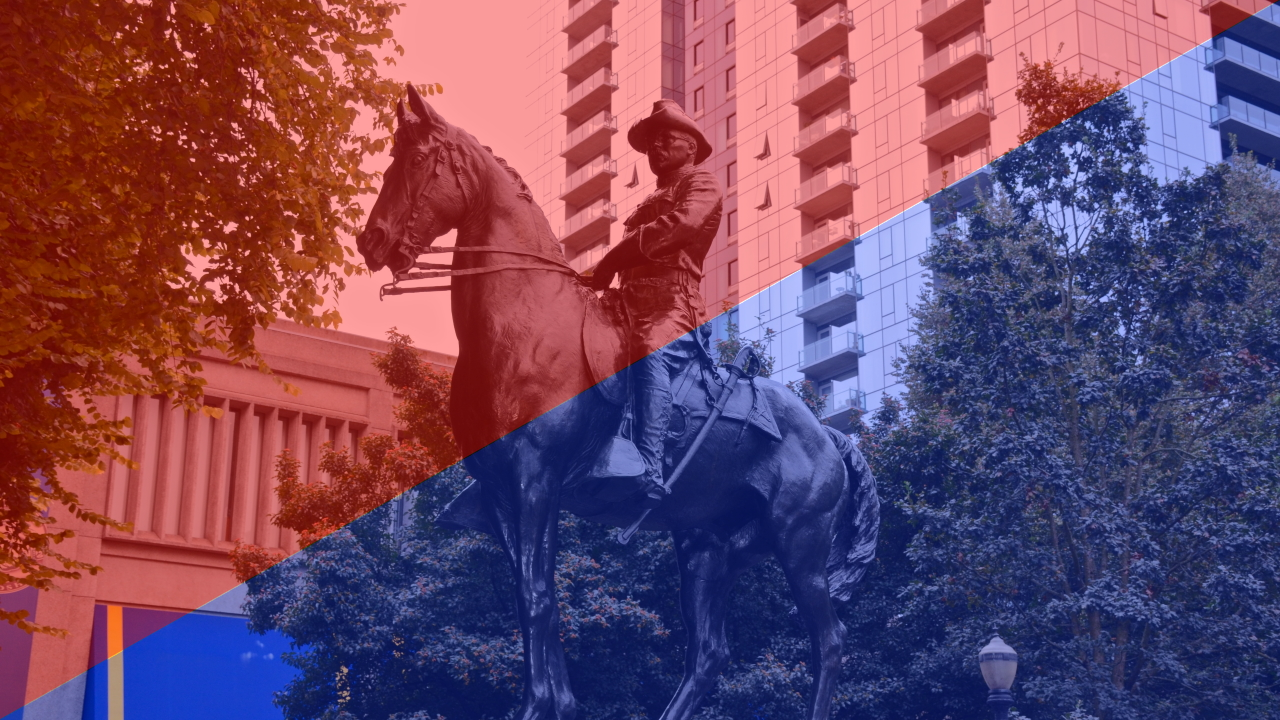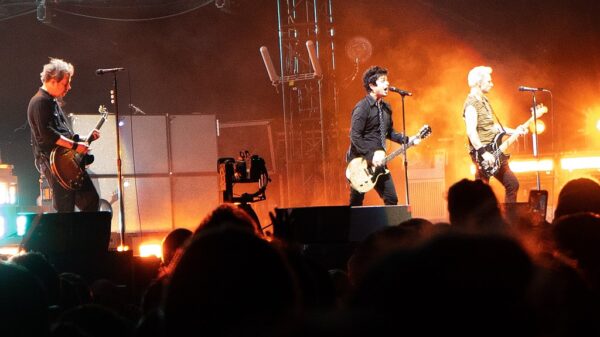Roar writer Cristiana Sandeva’s analysis on the toppling of statues in Portland, the response from Trump, and polarisation in the US.
On October 11, the eve of Columbus Day in the US, protesters gathered in Portland, Oregon to manifest against the national holiday, initiating a parallel one called Indigenous Peoples Day of Rage. During the night, statues of former Presidents Theodore Roosevelt and Abraham Lincoln were toppled and drawn upon.Â
President Trump addressed the protest through a series of tweets, which have become a well-established means of communication of his. His two direct comments on the Portland event were “The Radical Left fools in Portland don’t want any help from real Law Enforcement which we will provide instantaneously. Vote!†and “These are Biden fools. ANTIFA RADICALS. Get the FBI, and get them now!â€
Protesters sprayed “Dakota 38†on Lincoln’s statue pedestal and vandalised both of the former Presidents’ monuments before and/or after taking them down.
Stepping back to analyse the topic of taking down statues at large before contextualising it within the USA and the upcoming election, I have noticed two commonly repeated opinions on this matter.
One widespread take is that statues commemorating violent historical episodes and celebrating figures linked to one or another form of oppression should be taken down.
The other widespread opinion is that taking a monument down is dangerous, as it would imply erasing or altering history, without necessarily improving the present. The first stance envisions the toppling of statues as a needed step towards fixing such concepts as heritage and national identity, whereas the second one sees it as perilous damage to those same concepts.
If supported by thought-through arguments, neither of the two points could be discarded as completely unattainable or irrational. You may support one of the two or have another view, but your argument would be fairly limited if you were to claim the opposing opinion was absolutely insane, regardless of where you stand.
This is a complex topic and taking a one-sentence, one-thought stance would oversimplify it. Not rendering justice to the layers within this argument would be the most disrespectful (op)position to take.
What I feel is happening in the USA now is exactly that: justice is not being rendered to layers.
If you were to scrutinise political movement in current American society, you would be worried at how easy it is to identify clear patterns: protesters and anti-protesters, Trump opposition and Trump supporters, Black and White, the list goes on.
Radical ideas can easily spread in such an environment. Radicalisation does not lead to dialogue between opposing views, and it is not the starting point of revolutionary change or constructive conservatism either. Radicalisation leads to polarisation. Polarisation leads to dwindling perspective, loss of context and, ultimately, to nothing concrete but empirical and mental limitation.
I have been very glad to see, lately, that efforts are being made to decolonise curricula, mindsets, and conversations. However, I believe that an underlying issue needs to be tackled for these talks to effectively bring progress, and that is the issue of polarisation. If you wish to properly decolonise a discourse, you first need to depolarise it.Â
That being premised, we can now go back to the concrete topic of the actions carried out during the Portland protest, President Trump’s reactions to it, and the public response to both. What can be seen in the United States at present, at least from an external observer’s point of view, is a very strong polarisation, both ideological and practical.

On the one hand, you have the President labelling people as “x fools†where “x†can stand for “Bidenâ€, “Radical Left†or whichever label is more convenient at any given circumstance. His simplistic labelling of people groups is part of a consciously chosen, polarised outlook. Despite being meant to equally represent all citizens of his country, he divides them into groups, labels them, and expresses coarse judgments. He ends up being a leader with a polarised view. This sets him in a stance of favouritism towards a portion of the population he represents, and against another he deliberately calls “foolsâ€.
The “fools†he identifies are American citizens. Calling them “fools†will certainly not make them willing to have a debate with him, or to open a conversation. The outcomes of this polarised approach should not come as a surprise, then.
The “fools†keep fooling around, sometimes peacefully and sometimes violently. Instead of trying to initiate a constructive confrontation with them, the President discards and openly despises them. It is not important here to establish whether someone is more right or more wrong than the other. This is about the United States becoming divided. It is about polarisation splitting up the US with nothing possibly constructive coming out of it.
The physical aggression in toppling an inanimate statue and the verbal aggression condemning it are both acts of violence. Entering that loop and just adding up content to it can ultimately just breed more hatred and more polarisation. On top of that, one of the factions which appears to choose aggressing instead of addressing is the President himself, politically complicating the situation even further.
This situation is, in almost all instances, being handled with a single general intention: to take down. Protesters want to take Trump down, Trump wants to bring protesters down in turn. Everyone urges others to vote – and that is really good – but people are voting out of individual anger rather than a civic sense of belonging, and that is not optimal.
The US is now experiencing violence in different ways on different sides, which is only contributing to the saturation of the aforementioned polarisation process. The real question now is: where will this go from here? The way to the elections could be a path forward if made use of properly. However, neither the road towards the elections nor their outcomes will provide an answer to the polarisation issue. Why is such little speech and thought being spent on how to build something up in America? How will the States stay United if polarised opinions and actions are featured on the daily agenda?
And, if an average student in London can provide analysis on this rather than pure critique, why is President Trump refusing to give an analytical approach a try, and still opting for simplification? Strumentalising facts to make political statements is easy, but it is not political. It is simplistic and dangerous.
Newton’s third rule of physics states that “for every action, there is an equal and opposite reactionâ€. It is remarkable to see how well this could be applied to American politics right now. It is also worrying, given politics should not be so simple as to fit into a basic rule of classical physics. Simplifying politics to physics would mean turning a society built of tensions and passions into a skeleton, which may make it easy to understand processes, but it would definitely not make it trustworthy.
I get the feeling that all Americans are angry, regardless of the side they are on. Rage against rage can only breed aggressive acts and aggressive language, both leading to miscommunication. But spitting on each other is not a great idea, especially nowadays.
A good place to start working towards depolarisation would be peaceful, open dialogue. Hopefully, the elections and what comes out of them will open the path towards that.
Further articles written in collaboration with the Boston Political Review can be found on our website.

















